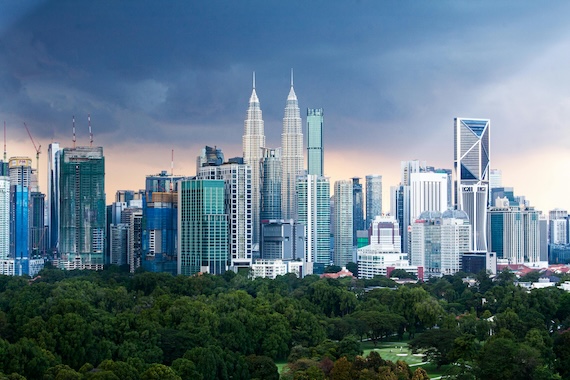( Middle East Monitor ) – At the 2025 ASEAN-GCC-China Summit in Kuala Lumpur, leaders from Asia and the Arab world gathered under the glow of diplomatic language and cautious optimism. The joint statement from the summit acknowledged key developments — including the International Court of Justice’s advisory opinion deeming Israel’s occupation unlawful, and praised efforts like Qatar’s ceasefire mediation and China’s facilitation of Palestinian national unity. But in the face of mounting atrocities and the collapse of the so-called peace process, the time for rhetorical solidarity has long passed.
What the world demands now from ASEAN, the Gulf Cooperation Council (GCC), and China is not more resolutions or symbolic affirmations. What’s needed is action — concrete, coordinated, and consequential — to finally bring Israel’s aggression to an end and to fundamentally reshape the path toward Palestinian liberation.
For over three decades, the international community has clung to the mirage of the two-state solution — a diplomatic fantasy that has become more illusory with each new Israeli settlement, each new demolished Palestinian home, and each fresh cycle of violence. Even as the Kuala Lumpur statement “supports efforts toward a two-state solution,” this language fails to reckon with the ground reality: the possibility of a viable, sovereign Palestinian state alongside Israel is not just dwindling — it is dead.
The world must admit what Palestinians have long known. The two-state solution is no longer a roadmap. It is a fig leaf, used to deflect pressure while maintaining a status quo that benefits Israel and shields its allies from accountability. It is time to move beyond this illusion and toward a serious reimagining of the future — one that guarantees equal rights, dignity, and self-determination for all who live between the river and the sea.
This is where ASEAN, the GCC, and China must move from passive affirmation to proactive leadership. For years, the Palestinian issue has been diplomatically dominated by Western powers — led by the United States — whose financial, military, and political support for Israel has ensured the perpetuation of occupation. But today, as the influence of the West wanes and a multipolar world emerges, a new axis of influence — stretching from Southeast Asia to the Gulf to Beijing — has a historic opportunity to lead where Washington has failed.
To do so, these nations must first confront their own contradictions. Several ASEAN and GCC countries, as well as China, maintain active trade, diplomatic, and in some cases military relations with Israel. These ties — masked by statements of solidarity — directly empower the very state that occupies and oppresses Palestine. You cannot simultaneously condemn the occupation and help sustain the occupier.
Ending these ties — whether they are economic partnerships, arms deals, or covert intelligence collaborations — is the most immediate, measurable, and moral step these countries can take. The message must be clear: there is a cost for apartheid and aggression. If Israel continues to defy international law and human decency, it must face real political and economic isolation — not just from Europe or North America, but from the rest of the world.
Beyond merely scaling back ties with Israel, ASEAN, the GCC, and China must take the lead in forging a new global coalition grounded in justice, legality, and accountability. This means actively supporting international legal proceedings — including South Africa’s landmark cases against Israel at the International Court of Justice and the International Criminal Court — to ensure that violations of international law are met with consequences, not impunity. It also requires stepping in where the West has retreated: bolstering financial and political support for UNRWA, which continues to face deliberate defunding campaigns aimed at dismantling essential humanitarian aid. And crucially, it means granting full diplomatic recognition and sustained material support to the Palestinian state, not as a symbolic gesture, but as a concrete assertion of its political legitimacy and right to exist on equal footing in the international community.

Photo of Kuala Lumpur by Yulia: https://www.pexels.com/photo/high-rise-buildings-of-kuala-lumpur-3815533/
Moreover, the upcoming international conference on Palestine, co-chaired by Saudi Arabia and France, must be more than just another forum for recycled positions. It must set in motion a post-two-state framework: one that centers decolonization, addresses the right of return, and ensures democratic rights for all residents of the land — whether in Gaza, the West Bank, or within Israel’s 1948 borders.
The moral arc of history may bend toward justice, but only if people — and nations — push it. The leaders of ASEAN, the GCC, and China now stand at a moral juncture. They can continue issuing cautious statements and playing diplomatic double games, or they can recognize this moment for what it is: a chance to reshape global politics in the service of freedom.
It is no longer acceptable to be “neutral” while Israel bombs refugee camps, targets hospitals, and treats international law with impunity. It is no longer enough to wait for Washington to change course when it is Washington that wrote the map of occupation in the first place.
A world without US hegemony is not just inevitable — it is already in motion. The question is whether this new world will be one in which emerging powers perpetuate the same old injustices under new names, or whether they will finally act on the values they claim to uphold.
In Kuala Lumpur, the ASEAN-GCC-China Summit declared its concern. The world is watching to see if they now have the courage to act.
The views expressed in this article belong to the author and do not necessarily reflect the editorial policy of Middle East Monitor or Informed Comment.
 Unless otherwise stated in the article above, this work by Middle East Monitor is licensed under a Creative Commons Attribution-NonCommercial-ShareAlike 4.0 International License.
Unless otherwise stated in the article above, this work by Middle East Monitor is licensed under a Creative Commons Attribution-NonCommercial-ShareAlike 4.0 International License.
 © 2026 All Rights Reserved
© 2026 All Rights Reserved